|
 This year's Singapore Conference was co-organized by the Vietnamese and Singaporean committees of PECC with the title, "Post-2020 Agenda: Rising protectionism, economic rebalancing, and diversified growth." This year's Singapore Conference was co-organized by the Vietnamese and Singaporean committees of PECC with the title, "Post-2020 Agenda: Rising protectionism, economic rebalancing, and diversified growth."
Protectionism is on the rise as trade slows and the blame of job losses and economic slowdown are turned to globalization. Income inequality continues to widen in both developed and developing economies. While middle class purchasing power and consumption are increasing as are activities in the services sector, there is not enough to support the ongoing restructuring of the manufacturing cluster and production value chain. Rapid technological advances that brought radical industrial and lifestyle changes through e-commerce, sharing economy and automation present both opportunities and concerns about the future global economy. In this context, the first plenary addressed the need for a coherent approach toward external economic relations.
Mr. Lim Hng Kiang, Minister of Trade of Singapore said in his opening speech, "as we approach the deadline for the Bogor Goals, APEC is at an inflection point." "Amidst a backdrop of sluggish growth and concerns about employment, income inequality and immigration, anti-trade sentiments have been on the rise." While the benefits of globalization may not have been distributed evenly, "we should not make globalization the scapegoat for slowing growth and unemployment," he stressed.
Mr. Bui Thanh Son, Standing Deputy Minister of Foreign Affairs of Vietnam, referred to 2017 as "an unpredictable and critical yera for APEC and the region," in his keynote speech. He added that we were only a few years away from the expiry of Bogor Goals and urged every member economy to join hands to work together and make this year a successful one in the face of many new challenges in the region.
The panelists of the second plenary reviewed how much progress has been made on each of the five attributes (balanced, inclusive, sustainable, innovative, and secure) of the APEC Growth Strategy since it was adopted in 2010, especially in respect to SMEs, e-commerce, and financial inclusion.
The third and fourth plenary sessions covered the physical, institutional, and people-to-people aspects of the Connectivity agenda that was adopted by APEC Leaders in 2014. Promotion of tourism, education services, improvements in 'ease of doing business,' and ensuring food security were the main focus areas in addressing people-to-people connectivity.
The fifth and last plenary was dedicated to reviewing the Bogor Goals and reshaping the common resolve into another form beyond 2020 when the target date for developing economies to achieve free trade and investment expires. While significant progress has been made on many fronts, some members are still facing the same challenges that have pre-existed while new ones have emerged since. The global economic landscape has changed vastly since Bogor Goals were first announced in 1994, protectionism is on the rise, recovery of major engines of growth remains elusive, export-oriented economies are finding it painful to cope with economic restructuring. With 2020 fast approaching, APEC members need to re-evaluate the original aims of the Bogor Goals and reshape them into new sets of goals in accordance with the changed circumstances.
Detailed program agenda is found here.
Related press release
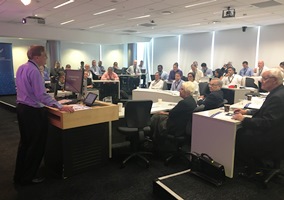 The three-part seminar series under the broad theme of ‘Managing the Blue Economy,’ an initiative of France (Pacific Territories) committee of PECC, concluded in Auckland in December 2016. This final seminar was hosted by the New Zealand Committee of PECC, in collaboration with the University of Auckland. The two earlier seminars were in Papeete (October 2015) and Busan (April 2016). The Auckland seminar brought together speakers from around the region representing port authorities, shipping lines and cruise operators, port service providers, maritime regulatory authorities and research institutes. The three-part seminar series under the broad theme of ‘Managing the Blue Economy,’ an initiative of France (Pacific Territories) committee of PECC, concluded in Auckland in December 2016. This final seminar was hosted by the New Zealand Committee of PECC, in collaboration with the University of Auckland. The two earlier seminars were in Papeete (October 2015) and Busan (April 2016). The Auckland seminar brought together speakers from around the region representing port authorities, shipping lines and cruise operators, port service providers, maritime regulatory authorities and research institutes.
The program agenda was timely and topical, highlighted on the eve of the seminar by further dramatic evidence of current pressures on the shipping sector with the demise of Hanjin Line and the major new consolidation through Maersk’s takeover of Hamburg Sud. The seminar addressed such relevant subjects as the critical place that ports hold in supply chain management, the impacts of ever-larger container vessels and cruise ships, the implications of the trend towards integrated port services, and the likely consequences for the patterns of Pacific trade flows of emerging mega-regional agreements. There was opportunity to review vital safety and security issues, risk and insurance factors, and to look at the technological and operational innovations being adopted by ports and shipping lines to become more energy-efficient and economically competitive. A notable part of the program was a site visit hosted by Ports of Auckland. The final session focussed on the particular maritime challenges faced by small Pacific island ports, with several case studies presented, and a panel with the pertinent theme of ‘the future of hubs and feeder services’.
A comprehensive briefing paper prepared for seminar participants is found here.
Program agenda with presentations for download
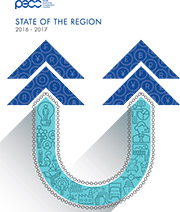 This year's State of the Region (SotR) report was released in Lima, Peru during the APEC Leaders' Week through a media briefing held at the International Media Center. Media interest was mainly focused on the fate of the TPP and its implications for APEC as well as the issue of rising anti-trade sentiments. This year's State of the Region (SotR) report was released in Lima, Peru during the APEC Leaders' Week through a media briefing held at the International Media Center. Media interest was mainly focused on the fate of the TPP and its implications for APEC as well as the issue of rising anti-trade sentiments.
The Report this year focused on the services trade and features a chapter contributed by Dr. Sherry M. Stephenson, Senior Fellow at the International Centre for Trade and Sustainable Development (ICTSD) and a member of the PECC Services Network. She emphasizes on the importance of services liberalization given the potential benefits that services can generate in respect to employment, enhanced productivity and innovation, and in efforts toward achieving a more inclusive growth patterns.
The Report also includes the results of PECC annual survey of the regional policy community on key developments and challenges that the Asia-Pacific as a region is facing. According to the 743 respondents who participated in this year's survey conducted from August to September 2016, the top 5 priorities that the APEC Leaders’ should address in Lima were:
- Progress towards the Bogor Goals and the Free Trade Area of the Asia-Pacific (FTAAP)
- The APEC Growth Strategy
- Structural reforms
- The emergence of anti-globalization & anti-trade sentiments
- Improvement in regional logistics & transport connectivity
Press release
News clippings
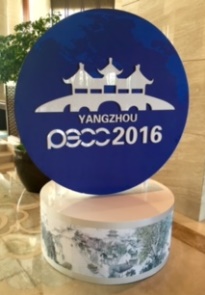 China National Committee for Pacific Economic Cooperation (CNCPEC) held an international symposium on Connecting the Connectivities in the Asia-Pacific in Yangzhou, China on September 27, 2016. China National Committee for Pacific Economic Cooperation (CNCPEC) held an international symposium on Connecting the Connectivities in the Asia-Pacific in Yangzhou, China on September 27, 2016.
Over 120 participants from 23 member economies of PECC, as well as representatives of APEC, ASEAN, and UNESCAP attended the Symposium.
The Symposium was held against the backdrop of rising movement of connectivity building across the Pacific region and the APEC’s commitment to building a seamlessly and comprehensively connected and integrated Asia-Pacific, as manifested in “APEC Connectivity Framework” in Bali in 2013 and the “APEC Connectivity Blueprint for 2015-2025” in Beijing in 2014.
Asia-Pacific Connectivity is not only the prerequisite for realizing the regional economic integration, but also indispensable to revitalizing the economy and promoting the long-term inclusive growth and sustainable development. Based on such premises, this symposium provided an occasion to explore the pathways to connect various connectivity initiatives within the region, facilitating the building of a seamlessly and comprehensively connected and integrated Asia-Pacific.
Agenda of Symposium, "Connecting the Connectivities":
Session 1. The Inner Links between the Regional and Sub-regional Connectivity Initiatives and the Opportunities and Challenges for Connecting these Initiatives
Session 2. Physical Connectivity: Sharing Experiences and Exploring the Practicable Ways of Interconnecting Various Initiatives
Session 3. Institutional Connectivity: Sharing Experiences and Exploring the Practicable Ways of Interconnecting Various Initiatives
Session 4. People-to-People Connectivity: Sharing Experiences and Exploring the Practicable Ways of Interconnecting Various Initiatives
Session 5. Recommendations for Connecting the Connectivity-related Initiatives within the Asia-Pacific Region
During the one-day discussion, the participants affirmed the significance of connectivity in both boosting economic growth and regional economic integration; they shared thoughts on the methodology of advancing APEC’s connectivity agenda; they raised principles on promoting connectivity; they suggested ways for connecting the regional and sub-regional endeavors to promote connectivity, and connecting the various initiatives in dimensions of physical, institutional and people-to-people connectivity.
The participants emphasized the role of platforms in promoting the APEC connectivity process. Elaborating on the interrelationship between the three pillars of connectivity, the participants recommended a holistic approach to promote connectivity in the Asia Pacific. The participants encouraged relevant organizations and regions to enhance coordination. It is especially necessary to connect the financial institutions support physical connectivity building. The participants also highlighted the importance of regulatory congruence and human mobility in the Asia Pacific region.
An executive summary of the Symposium was submitted to the APEC Senior Officials at the Concluding Senior Officials' Meeting (CSOM), held in Lima, Peru, on November 15th, 2016.
MEMBER COMMITTEE UPDATES
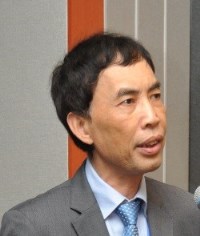 Dr. Vo Tri Thanh is the new Chair for the Vietnamese committee for PECC. Dr. Vo is currently the senior expert of the Central Institute for Economic Management (CIEM). Dr. Vo Tri Thanh is the new Chair for the Vietnamese committee for PECC. Dr. Vo is currently the senior expert of the Central Institute for Economic Management (CIEM).
Dr. Vo mainly undertakes research and provides consultation on issues related to trade liberalization and international economic integration and macroeconomic policies. His other areas of interests include institutional reforms, financial system and economic development. He has received a bachelor of science from the Moscow State University, and a master's degree and PhD in economics from the Australian National University.
He takes over the position from Mr. Vu Tien Loc, former VNCPEC Chair.
PUBLICATIONS
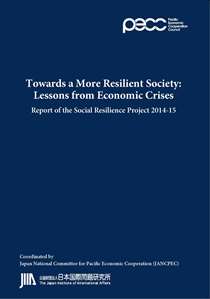 ISBN 978-4-8193-0213-5 ISBN 978-4-8193-0213-5
154 pages
The Japan Institute of International Affairs (JIIA)
Table of Content
1. Inclusive growth and social security (Nobuhide Hatasa)
2. Migrant workers and social protection: The Philippine experience (Aniceto C. Orbeta, Jr.)
3. Thailand: Social resilience in a divided society (Yasuhito Asami)
4. Social protection and the informal economy in Malaysia (Jun-E Tan)
5. Social security system: The Korean case (Sook Hee Choi and Mikyung Yun)
6. Challenges and reforms of social security system due to ageing population in Chinese Taipei (Ke-Jeng Lan)
Foreword
A series of regional and global financial crises highlighted the need to enhance the resilience of social infrastructure against sudden shocks, particularly for those categorized as vulnerable groups. More recently, a persistent and widening social divide that casts a shadow on the stability of national and global systems presents a serious challenge, and more social policies need to be developed to mitigate this gap.
In response to these challenges within the Asia-Pacific regional context, the Japan National Committee for Pacific Economic Cooperation (JANCPEC) has been conducting the Social Resilience Research Project (SR Project) as a Pacific Economic Cooperation Council (PECC) International Project since 2010. The SR Project aims to shed light on the importance of social security and to closely examine its role in the domestic economy. In addition, the SR Project is the first ambitious attempt by the APEC/PECC family to discuss social policy dimensions, as APEC and PECC have traditionally focused on trade and investment liberalization issues. More...
|






 Dr. Vo Tri Thanh is the new Chair for the Vietnamese committee for PECC. Dr. Vo is currently the senior expert of the Central Institute for Economic Management (CIEM).
Dr. Vo Tri Thanh is the new Chair for the Vietnamese committee for PECC. Dr. Vo is currently the senior expert of the Central Institute for Economic Management (CIEM).